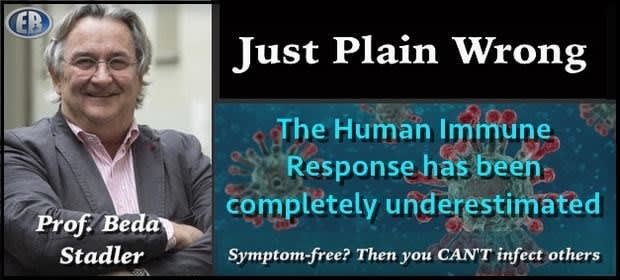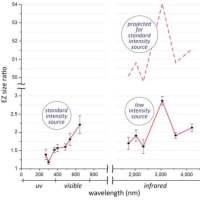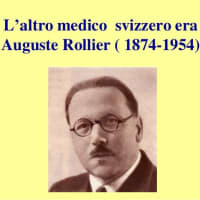
2.ベダ・M・シュタドラー(ベルン大学免疫研究所の元所長): 第2波はない、新型コロナは夏に変異して消滅する季節性の風邪ウイルス
- Immunology of common sense常識の免疫学
As an immunologist I trust a biological model, namely that of the human organism, which has built a tried and tested, adaptive immune system.
免疫学者として、私は生物学的モデル、つまり、実証済みの適応免疫システムを構築した人間のモデルを信頼しています。
At the end of February, driving home from the recording of [a Swiss political TV debate show], I mentioned to Daniel Koch [former head of the Swiss federal section “Communicable Diseases” of the Federal Office of Public Health] that I suspected there was a general immunity in the population against Sars-Cov-2.
2月の終わりに、[スイスの政治テレビ討論番組]の録画から家に帰ったとき、私はダニエルコッホ[元連邦保健局のスイス連邦セクション「伝染病」の元ヘッド]に、私は、Sars-Cov-2に対する集団の一般的な免疫があると疑っていると述べました。
He argued against my view.
彼は私の見解に反対しました。
I later defended him anyway, when he said that children were not a driving factor in the spread of the pandemic.
子供たちはパンデミックの蔓延の原動力ではなかったと彼が言ったとき、とにかく後で私は彼を擁護しました。
He suspected that children didn’t have a receptor for the virus, which is of course nonsense.
彼は子供たちがウイルスの受容体を持っていなかったと疑っていました、それはもちろんナンセンスです。
Still, we had to admit that his observations were correct.
それでも、私たちは彼の観察が正しかったことを認めなければなりませんでした。
But the fact that every scientist attacked him afterwards and asked for studies to prove his point, was somewhat ironic.
しかし、その後すべての科学者が彼を攻撃し、彼の主張を証明するための研究を求めたという事実は、いくぶん皮肉なことでした。
Nobody asked for studies to prove that people in certain at-risk groups were dying.
特定のリスクのあるグループの人々が亡くなっていることを証明するための研究を誰も求めませんでした。
When the first statistics from China and later worldwide data showed the same trend, that is to say that almost no children under ten years old got sick, everyone should have made the argument that children clearly have to be immune.
中国からの最初の統計とその後の世界的なデータが同じ傾向を示したとき、つまり、10歳未満の子供が病気になることはほとんどないということは、子供は明らかに免疫があるに違いないという議論を誰もがすべきだったということです。
For every other disease that doesn’t afflict a certain group of people, we would come to the conclusion that that group is immune.
特定のグループの人々を苦しめない他のすべての病気について、そのグループは免疫があるという結論に達します。
When people are sadly dying in a retirement home, but in the same place other pensioners with the same risk factors are left entirely unharmed, we should also conclude that they were presumably immune.
老人ホームで悲しいことに死につつあるが、同じ場所に同じ危険因子を持つ他の年金受給者がまったく無傷のままである場合、私たちは彼らがおそらく免疫があったと結論付けるべきです。
But this common sense seems to have eluded many, let’s call them “immunity deniers” just for fun.
しかし、この常識を多くの人が理解できないように思われます、単に楽しみのために彼らを「免疫否定論者」と呼びましょう。
This new breed of deniers had to observe that the majority of people who tested positive for this virus, i.e. the virus was present in their throats, did not get sick.
この新種の否定論者は、このウイルスに陽性反応を示した人々の大多数、すなわちウイルスが喉に存在していたが、発病しなかったことを観察しなければなりませんでした。
The term “silent carriers” was conjured out of a hat and it was claimed that one could be sick without having symptoms.
「サイレントキャリア」という用語は帽子から素早く用意され、症状がなくても病気である可能性があると主張されていました。
Wouldn’t that be something!
それはすごいものではないでしょうか!
If this principle from now on gets naturalised into the realm of medicine, health insurers would really have a problem, but also teachers whose students could now claim to have whatever disease to skip school, if at the end of the day one didn’t need symptoms anymore to be sick.
この原則がこれから医学の領域で当たり前になるならば、健康保険会社は本当に問題があります、また、1日の終わりにもう病気になる必要がなくなったとしたら、生徒が学校を休むためのどんな病気でも今持っていると主張できる教師も同じです。
The next joke that some virologists shared was the claim that those who were sick without symptoms could still spread the virus to other people.
一部のウイルス学者が共有した次の冗談は、無症状で病気になった人でもウイルスを他の人に感染させることができるという主張でした。
The “healthy” sick would have so much of the virus in their throats that a normal conversation between two people would be enough for the “healthy one” to infect the other healthy one.
「健康な」病人は、喉にウイルスが非常に多く含まれているため、「健康な人」が他の健康な人に感染させるには、2人の通常の会話で十分です。
At this point we have to dissect what is happening here: If a virus is growing anywhere in the body, also in the throat, it means that human cells decease.
この時点で、ここで何が起こっているのかを分析する必要があります。ウイルスが体内のどこかに、また喉にも成長している場合、それは人間の細胞が死滅することを意味します。
When [human] cells decease, the immune system is alerted immediately and an infection is caused.
[ヒト]細胞が死ぬと、免疫系に即座に警告が出され、感染が引き起こされます。
One of five cardinal symptoms of an infection is pain.
感染症の5つの主要な症状の1つは痛みです。
It is understandable that those afflicted by Covid-19 might not remember that initial scratchy throat and then go on to claim that they didn’t have any symptoms just a few days ago.
Covid-19に苦しむ人々は、最初のチクチクする喉を覚えておらず、数日前に症状がなかったと主張するかもしれません。
But for doctors and virologists to twist this into a story of “healthy” sick people, which stokes panic and was often given as a reason for stricter lockdown measures, just shows how bad the joke really is.
しかし、医師やウイルス学者がこれを「健康な」病気の人の話にねじ込むと、パニックを引き起こし、しばしばより厳しいロックダウン措置の理由として与えられ、冗談が本当にどれほどひどいかを示します。
At least the WHO didn’t accept the claim of asymptomatic infections and even challenges this claim on its website.
少なくともWHOは無症候性感染症の主張を受け入れず、ウェブサイトでこの主張に異議を唱えさえしました。
Here a succinct and brief summary, especially for the immunity deniers, of how humans are attacked by germs and how we react to them: If there are pathogenic viri in our environment, then all humans — whether immune or not — are attacked by this virus.
ここでは、特に免疫否定論者のための、人間がどのように細菌に攻撃され、どのように反応するかについての簡潔で短い要約を示します。環境に病原性ウイルスが存在する場合、免疫の有無にかかわらず、すべての人間がこのウイルスに攻撃されます 。
If someone is immune, the battle with the virus begins.
誰かが免疫がある場合、ウイルスとの戦いが始まります。
First we try to prevent the virus from binding to our own cells with the help of antibodies.
まず、抗体を使ってウイルスが自分の細胞に結合するのを防ぎます。
This normally works only partially, not all are blocked and some viri will attach to the appropriate cells.
これは通常、部分的にのみ機能し、すべてがブロックされるわけではなく、一部のウイルスが適切な細胞に付着します。
That doesn’t need to lead to symptoms, but it’s also not a disease.
それは、症状につながる必要はありませんが、それはまた病気ではありません。
Because the second guard of the immune system is now called into action.
免疫システムの2番目の警備員が行動のために呼ばれるからです。
That’s the above mentioned T-cells, white blood cells, which can determine from the outside in which other cells the virus is now hiding to multiply.
これは、上記のT細胞、白血球です。これにより、ウイルスが増殖するために隠れている他の細胞を外部から判別できます。
These cells, which are now incubating the virus, are searched throughout the entire body and killed by the T-cells until the last virus is dead.
現在ウイルスを培養しているこれらの細胞は全身で検索され、最後のウイルスが死ぬまでT細胞によって殺されます。
So if we do a PCR corona test on an immune person, it is not a virus that is detected, but a small shattered part of the viral genome.
したがって、免疫のある人に対してPCRコロナテストを行う場合、検出されるのはウイルスではなく、ウイルスゲノムの細かく砕かれた部分です。
The test comes back positive for as long as there are tiny shattered parts of the virus left.
ウイルスの細かく砕かれた部分が残っている限り、テストは陽性に戻ります。
Correct: Even if the infectious viri are long dead, a corona test can come back positive, because the PCR method multiplies even a tiny fraction of the viral genetic material enough [to be detected].
正しい解釈:PCR法ではウイルスの遺伝物質のごくわずかな部分さえ(検出されるほど)増殖するので、感染性ウイルスが長い間死んでいても、コロナテストは陽性に戻る可能性があります。
That’s exactly what happened, when there was the global news, even shared by the WHO, that 200 Koreans who already went through Covid-19 were infected a second time and that there was therefore probably no immunity against this virus.
「すでにCovid-19を経験した200人の韓国人が2度目に感染したため、おそらくこのウイルスに対する免疫はなかった」という、WHOでさえ共有されている世界的なニュースがあったときに、それはまさに起こったことです。
The explanation of what really happened and an apology came only later, when it was clear that the immune Koreans were perfectly healthy and only had a short battle with the virus.
実際に何が起こったかの説明と謝罪は、免疫のある韓国人が完全に健康であり、ウイルスとの短い戦いしかなかったことが明らかになった後になって初めてやってきました。
The crux was that the virus debris registered with the overly sensitive test and therefore came back as “positive”.
重要なのは、ウイルスの残骸が過度に敏感なテストに登録され、「陽性」として戻ってきたことです。
It is likely that a large number of the daily reported infection numbers are purely due to viral debris.
毎日報告される感染数の多くは、純粋にウイルスの残骸が原因である可能性があります。
The PCR test with its extreme sensitivity was initially perfect to find out where the virus could be.
非常に感度の高いPCRテストは、ウイルスがどこにあるかを見つけるのに最初は完璧でした。
But this test can not identify whether the virus is still alive, i.e. still infectous.
しかし、このテストでは、ウイルスがまだ生きているかどうか、つまり、まだ感染性があるかどうかを、確認できません。
Unfortunately, this also led some virologists to equate the strength of a test result with viral load, i.e. the amount of virus someone can breathe out.
残念ながら、これは一部のウイルス学者がテスト結果の強さを、ウイルス量、つまり誰かが吐き出すことができるウイルスの量と同等であるとすることも導きました。
Luckily, our day care centres stayed open nontheless.
幸いなことに、私たちのデイケアセンターはそれでも開いたままです。
Since German virologist missed that part, because, out of principle, they do not look at what other countries are doing, even if other countries’ case numbers are falling more rapidly.
ドイツのウイルス学者はその部分を見落としたので、たとえ他の国の症例数がより急速に減少しているとしても、原則として、彼らは他の国が何をしているかを見ないからです。
- The problem with corona immunityコロナ免疫の問題
What does this all mean in real life?
これは実際の生活ではどういう意味ですか?
The extremely long incubation time of two to 14 days — and reports of 22 to 27 days — should wake up any immunologist.
2〜14日間という非常に長い潜伏期間、および22〜27日間の報告が、全ての免疫学者が目を覚ますはずです。
As well as the claim that most patients would no longer secrete the virus after five days.
同様に、ほとんどの患者は5日以降にウイルスを分泌しないという主張もあります。
Both [claims] in turn actually lead to the conclusion that there is — sort of in the background — a base immunity that contorts the events, compared to an expected cycle [of a viral infection] — i.e. leads to a long incubation period and quick immunity.
両方の[主張]も実際には、[ウイルス感染の]予想されるサイクルと比較して、イベントをゆがめる基本免疫が背景にあるという結論につながります。
つまり、長い潜伏期間と迅速な免疫です。
This immunity also seems to be the problem for patients with a sever course of the disease.
この免疫はまた、病気の深刻な経過を持つ患者にとって問題であるようです。
Our antibody titre, i.e. the accuracy of our defence system, is reduced the older we get.
私たちの抗体力価、つまり防御システムの精度は、年をとるにつれて低下します。
But also people with a bad diet or who are malnourished may have a weakened immune system, which is why this virus does not only reveal the medical problems of a country, but also social issues.
しかし、食事が悪い人や栄養失調の人も免疫力が低下している可能性があります。そのため、このウイルスは国の医学的問題だけでなく、社会問題も明らかにします。
If an infected person does not have enough antibodies, i.e. a weak immune response, the virus slowly spreads out across the entire body.
感染した人が十分な抗体を持っていない場合、つまり免疫反応が弱い場合、ウイルスは全身にゆっくりと広がります。
Now that there are not enough antibodies, there is only the second, supporting leg of our immune response left: The T-cells beginn to attack the virus-infested cells all over the body.
十分な抗体がないので、私たちの免疫応答の第2の支持部分だけが残っています:T細胞は、体全体のウイルスに感染した細胞を攻撃し始めます。
This can lead to an exaggerated immune response, basically to a massive slaughter; this is called a Cytokine Storm.
これは拡大された免疫反応、基本的には大規模な虐殺につながる可能性があります。 これはサイトカインストームと呼ばれています。
Very rarely this can also happen in small children, in that case called Kawasaki Syndrome.
非常にまれに、これは小さな子供でも発生する可能性があり、その場合、川崎症候群と呼ばれます。
This very rare occurrence in children was also used in our country to stoke panic.
子供のこの非常にまれな出来事は、我が国でもパニックを起こすために使われました。
It’s interesting, however, that this syndrome is very easily cured.
しかし、この症候群が非常に簡単に治癒するのは興味深いことです。
The [affected] children get antibodies from healthy blood donors, i.e. people who went through coronavirus colds.
[影響を受ける]子供は、健康な献血者、つまりコロナウイルスの風邪にかかった人から抗体を取得します。
This means that the hushed-up [supposedly non-existent] immunity in the population is in fact used therapeutically.
これは、集団内の急上昇した[おそらく存在しない]免疫が実際に治療的に使用されていることを意味します。
What now? 今は何ですか?
The virus is gone for now.
ウイルスは今のところなくなっています。
It will probably come back in winter, but it won’t be a second wave, but just a cold.
おそらく冬に戻ってくるでしょうが、二度目の波ではなく、ただの風邪です。
Those young and healthy people who currently walk around with a mask on their faces would be better off wearing a helmet instead, because the risk of something falling on their head is greater than that of getting a serious case of Covid-19.
顔にマスクを付けて歩き回っている若くて健康な人々は、何かが頭に落ちるリスクがCovid-19の深刻な症例にかかるリスクよりも大きいため、代わりにヘルメットをかぶったほうがよいでしょう。
If we observe a significant rise in infections in 14 days [after the Swiss relaxed the lockdown], we’d at least know that one of the measures was useful.
(スイスがロックダウンを緩和した後)14日間で感染の大幅な増加が見られた場合、少なくとも1つの対策が有効であったことがわかります。
Other than that I recommend reading John P A Ioannidis’ latest work in which he describes the global situation based on data on May 1st 2020: People below 65 years old make up only 0.6 to 2.6 % of all fatal Covid cases.
それ以外は、John P A Ioannidisが2020年5月1日のデータに基づいて世界の状況を説明している最新の論文を読むことをお勧めします。65歳未満の人々は、すべての致命的なCovidケースの0.6〜2.6%しか占めていません。
To get on top of the pandemic, we need a strategy merely concentrating on the protection of at-risk people over 65.
パンデミックを乗り越えるには、リスクのある65歳以上の人々の保護のみに集中する戦略が必要です。
If that’s the opinion of a top expert, a second lockdown is simply a no-go.
それがトップエキスパートの意見である場合、2番目のロックダウン(封鎖)は単純に不要です。
On our way back to normal, it would be good for us citizens if a few scaremongers apologised.
通常に戻る途中で、少数の人を不安にさせる人が謝罪した場合、それは私たちの市民にとって良いでしょう。
Such as doctors who wanted a triage of over 80 year old Covid patients in order to stop ventilating them.
例えば、人工呼吸をやめるために80歳以上のCovid患者のトリアージを望んだ医師など。
Also media that kept showing alarmist videos of Italian hospitals to illustrate a situation that as such didn’t exist.
また、イタリアの病院の警報ビデオを上映し続け、存在しない状況を説明しているメディア。
All politicians calling for “testing, testing, testing” without even knowing what the test actually measures.
すべての政治家は、検査が実際に何を測定するのかさえ知らなくても、「検査、検査、検査」を求めています。
And the federal government for an app they’ll never get to work and will warn me if someone near me is positive, even if they’re not infectious.
そして連邦政府のアプリは、それらがうまくいくことはなく、近くにいる誰かが陽性であれば、たとえ感染性がなくても警告します。
In winter, when the flu and other colds make the rounds again, we can then go back to kissing each other a little less, and we should wash our hands even without a virus present.
冬になると、インフルエンザや他の風邪が再び流行り、少し少なくキスをすることに戻ることができ、ウイルスがなくても手を洗う必要があります。
And people who’ll get sick nonetheless can then don their masks to show others what they have learned from this pandemic.
それでも病気になる人は、マスクを着用して、このパンデミックから学んだことを他の人に示すことができます。
And if we still haven’t learned to protect our at-risk groups, we’ll have to wait for a vaccine that will hopefully also be effective in at-risk people.
リスクのあるグループを保護する方法をまだ学んでいない場合は、リスクのある人々にも効果が期待できるワクチンを待つ必要があります。
The original article was published in the Swiss magazine Weltwoche (World Week) on June 10th.
元々の記事は、6月10日にスイスの雑誌Weltwoche(World Week)で出版されました。
The author, Beda M Stadler is the former director of the Institute for Immunology at the University of Bern, a biologist and professor emeritus.
著者のベダ・M・シュタドラーは、ベルン大学免疫研究所の元所長で、生物学者で名誉教授です。
Our thanks to Back to Reason, Medium, for having brought this important article to our attention
この重要な記事に我々の注意を引いてくれた、理性、中道への回帰に感謝します。
*
Note to readers: please click the share buttons above or below. Forward this article to your email lists. Crosspost on your blog site, internet forums. etc.
Featured image is from OneWorld
The original source of this article is Weltwoche
Copyright © Beda M Stadler, Weltwoche, 2020
























